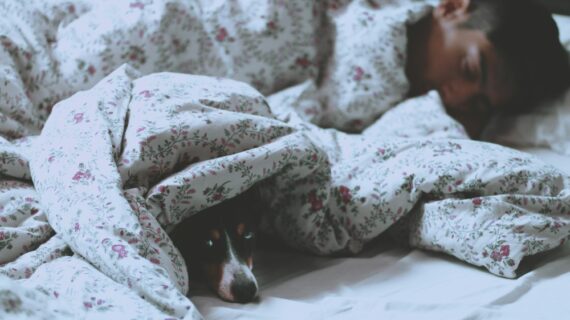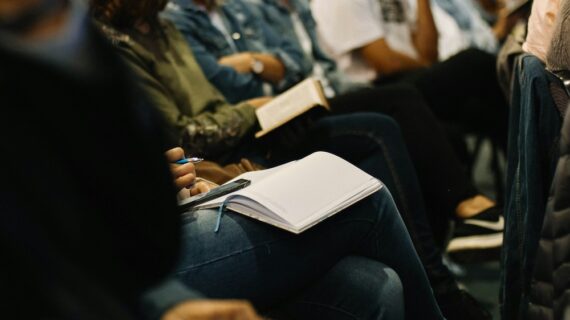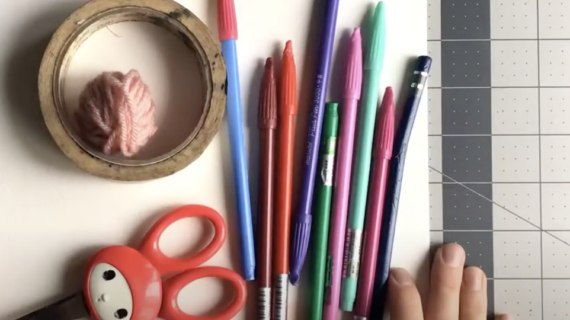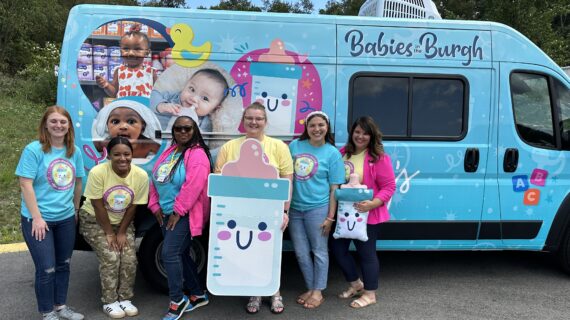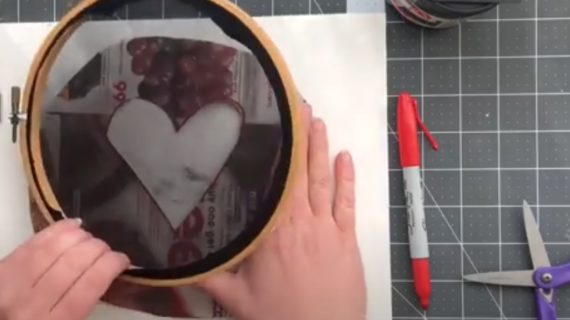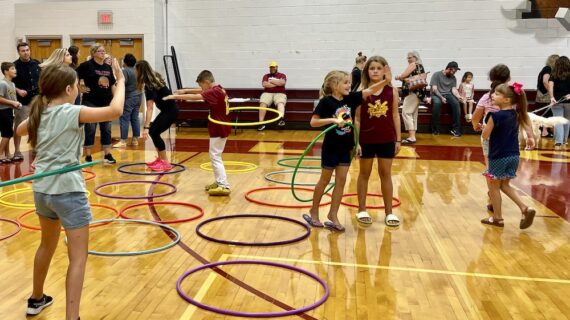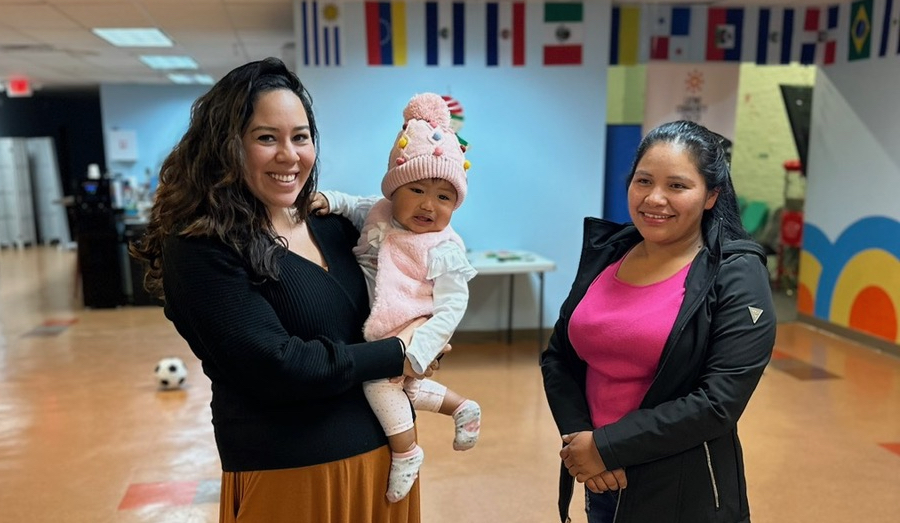
Discover the story of the Latino Community Center, which serves thousands in the Pittsburgh region
Photo above of Rosamaria Cristello at the Latino Community Center courtesy of The New Americans, a project of Pittsburgh Tomorrow.
Rosamaria Cristello’s journey to the United States began when she was just 8 months old, when her family moved from Guatemala to Arlington, Virginia.
“Like most families, my parents wanted to give my sister and me a better life,” she says. The early years were spent with extended family, all squeezed within a one-bedroom apartment, but they were happy times, recalls Cristello. “We were undocumented, but my parents did an incredible job ensuring my sister and I didn’t realize it.”
Their stable life was shattered when an immigration attorney advised the family that it was ok to return to Guatemala for a visit when Cristello was 8.
“We initially thought it was just a visit, but we ended up stuck there,” she says. The sense of displacement was acute. “My father eventually managed to return to Virginia and worked tirelessly to bring us back, too. I remember looking at the moon with my dad on the phone, both of us gazing at it together, as I pleaded with him to come and get me. Guatemala held a piece of my heart, but Virginia was home.”
After two years, her father reunited the family in the United States. But the hard journey and the separation left scars. “The stress and trauma of our experiences broke my family unit. My parents couldn’t make it, and my mom ended up raising my sister and me alone after my dad left,” Cristello says.
Two years later, when Rosamaria’s grandfather fell ill in Guatemala, her mom faced an excruciating choice: Visit her father before he died or stay with her family. She decided to take a risk and return to Guatemala to see her dad, leaving Cristello and her sister with friends and relatives.
“My mom saw her dad for a week before he passed away,” Cristello relays. “Her journey back to the U.S. was harrowing — she swam across rivers, crossed deserts and was even held captive. When she finally returned, she was a different person, both physically and mentally.”
Finding Support and Purpose
During those turbulent times, school became Cristello’s sanctuary. “My teachers and counselors were my support system. They guided me and helped me believe that my pathway forward was through education,” she says.
As a first-generation college student, Cristello faced many unknowns, including how to pay for her education. She signed any loan they put in front of her, not knowing what she was doing. And she changed her major at least five times before graduating in Geographic Information Systems (GIS) and environmental planning at Indiana University of Pennsylvania (IUP).
After college, she moved to Pittsburgh to get her master’s degree at Pitt’s Graduate School of Public and International Affairs, but her journey was complicated by a health scare that required surgery. “I experienced significant discrimination during this time, which opened my eyes to the challenges faced by other families,” she says.
Creating the Latino Community Center
In 2011, Cristello got accepted into the highly competitive Compass AmeriCorps program where she served as a volunteer at Catholic Charities. At the time the organization had nothing for Spanish speakers, so she had to figure out how to help Latino families on her own.
Two years later, Cristello became the site director of the Latino Family Center, one of 28 family centers owned by the AIU (Allegheny Intermediate Unit). During her tenure, she spearheaded a Latino Needs Assessment which documented how the existing structure couldn’t fully address the community’s broader needs.
As a result, she pushed for opening an independent nonprofit to create a Latino organization that was truly by and for the community. With the support of the Heinz Endowments, Cristello founded the Latino Community Center (LCC) in 2017.
This new organization took over the Family Center in 2020, with a significant expansion of services to serve the community’s diverse needs.
Today, the LCC is based in East Liberty with a staff of 40-plus that has served more than 2,000 families the past year through numerous services and programs. “Our services are based on what the community asks for,” says Cristello who is still clearly driven by her own family’s circumstances upon arriving in the U.S. “We look at the whole family unit and ensure everyone is supported.
“We started with a vision to create something that should have existed when my family first arrived.” As one example, her own painful college experience inspired her to start a program to help youths understand the financial aid process and better prepare for college.
It’s one of many youth programs. The LCC’s annual Back to School Bash, held at the Children’s Museum in early August this year, drew more than 200 Latinx students along with their parents, to stock up with backpacks and all the school supplies the kids needed. In addition, 118 schools had representatives on site so parents could connect with them and learn how to navigate the education system.
Education is key for the Latino Community Center, which just wrapped up a six-week summer camp where activities varied daily. One week focused on music and creativity with a drum circle and kids forming a multicultural band with ukuleles, claves, maracas and tambourines.
The work of the Latino Community Center not only addresses immediate needs, everything from food delivery to dental work, but also builds a foundation for future generations. “We help families navigate education, health, and legal systems because I’ve lived those challenges. We want to create a community where everyone can thrive,” says Cristello.
The LCC has been a lifeline for Maria Christina, a single mother who moved to Pittsburgh from Guatemala in 2016 without knowing much English. The LCC offered her not just language support, but assistance in securing financial resources, enrolling her children in school, finding free clinics, and help in getting her an immigration attorney.
“Honestly, I felt very supported, like I never thought I would feel,” says Christina, who is especially grateful for the after-school program.
“I feel very fortunate because they’ve thought of helping us in these ways, with our kids being in a safe space, learning, and doing a lot of activities,” she says. Her children return home “very happy” after a long day.

Impact and Vision for the Future
Cristello now has her own family that includes two young children, and she is active on boards and in various community initiatives. While she has received numerous awards for her work, the Executive Director takes the greatest pride in being selected as an Obama Leader in a program from the Obama Foundation that aims “to inspire, empower and connect regional changemakers” to accelerate positive change in their communities.
“This recognition put our community on the radar. When so many still can’t acknowledge that Latinos are here, when our community is marked as ‘other’ in research papers and presentations… well, this helps to dispel that.”
The LCC is now focused on establishing a Latino Youth Center, which should be ready by the end of 2025. “We already have a functional youth program but are in the process of constructing a formal space for it. My goal with this center is that it is a safe, welcoming space for our youth… where they feel valued and where they can explore and receive the guidance they may need in becoming the best version of themselves,” Cristello says.
“Our impact can be seen in our babies who receive early intervention and support, our children who retain their Spanish through afterschool programs, and our youth who feel they belong and thrive in our programs.”
She has advice for young Latinx individuals who, like her, aspire to make a difference in their communities. Like Cristello, they, too, will have challenges. “It is not you. Please do not internalize these obstacles as being your fault,” she urges. “Be proud of who you are, know that you have our community behind you and next to you cheering you on.”
This story is part of The New Americans, a project of Pittsburgh Tomorrow which seeks to reverse population loss through revitalization. See more stories here.
